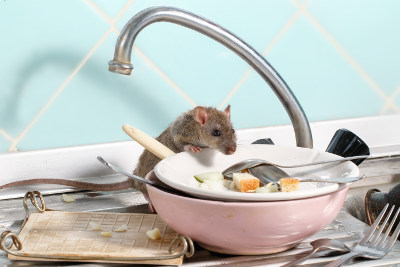
March 26th, 2020 by
With the country in lockdown over the coronavirus pandemic, many people are naturally concerned about their health. When reports emerged that a man in China had died from something called hantavirus, it quickly spread alarm across social media and news channels. But what actually is the hantavirus, and is it really something that you should be concerned about at this time? Put simply, are we likely to have to go through a second pandemic any time soon?
What is Hantavirus?
 Hantavirus is actually the name given to a family of viruses. It can cause a range of diseases, with many of them having similar symptoms to COVID-19 (the current strain of coronavirus spreading across the world). While it has a very high mortality rate and is very serious if you contract it, it’s considered much less serious than the coronavirus on the whole. This is because the likelihood of contracting it is incredibly small as it can only be transmitted by rodents – it doesn’t spread from person-to-person.
Hantavirus is actually the name given to a family of viruses. It can cause a range of diseases, with many of them having similar symptoms to COVID-19 (the current strain of coronavirus spreading across the world). While it has a very high mortality rate and is very serious if you contract it, it’s considered much less serious than the coronavirus on the whole. This is because the likelihood of contracting it is incredibly small as it can only be transmitted by rodents – it doesn’t spread from person-to-person.
How Does Hantavirus Spread?
There are many different strains of hantavirus, and each one is specific to a different rodent. It only spreads to people if they inhale or ingest particles of rodent bodily fluids. Usually, this occurs when people come into contact with something contaminated by rodent saliva or urine. Some strains can also be spread by rodent bites, although this is relatively rare.
Why Aren’t Scientists Concerned About Hantavirus?
Unlike COVID-19, hantaviruses aren’t new, and scientists have known about them since the 50s. The fact that it doesn’t transmit from person-to-person also means its impact on people across the world is likely to very limited. Provided you take care to protect yourself against rats and mice and you keep up good hygiene standards, the risk of contracting hantavirus is low.
At-Risk Groups
According to the CDC and the UK government, there are several groups that are more at risk from hantavirus. We’ll outline them below and explain what you can do to minimise your risk of coming into contact with the virus.
Pet Rat Owners and Breeders
 According to a Public Health England study, 32.9% of pet rat owners who were tested had hantavirus antibodies in their blood, meaning they’d previously been exposed to the virus. While it’s rare that pet owners will be exposed to the extent that they actually get sick, it’s still a good idea to take extra precautions when handling pet rats. Wear disposable gloves when cleaning out rat cages and make sure you always wash your hands immediately after handling the rat itself.
According to a Public Health England study, 32.9% of pet rat owners who were tested had hantavirus antibodies in their blood, meaning they’d previously been exposed to the virus. While it’s rare that pet owners will be exposed to the extent that they actually get sick, it’s still a good idea to take extra precautions when handling pet rats. Wear disposable gloves when cleaning out rat cages and make sure you always wash your hands immediately after handling the rat itself.
Occupationally-Exposed Groups
Occupationally-exposed people are those who are more likely to come into contact with pet or wild rats through their work. These groups include vets, farmers, pest controllers, and sewage workers. The Public Health England study into hantavirus found these people were no more at risk from the disease than the general public thanks to their professional hygiene standards.
Campers and Hikers
Campers and hikers who use trails close to rodent habitats are slightly more at risk of hantavirus infections. However, the current coronavirus pandemic means these activities are no longer taking place.
Those Who Have Rodent Infested Homes
Naturally, people who have rat or mouse infestations in their homes are more at risk of coming into contact with contaminated things. If you’re in the process of treating a rodent infestation, take extra care when cleaning around infested areas. Wear disposable gloves when handling rat traps or bait stations, and make sure you wash your hands immediately after removing your gloves.
Common Symptoms
People who do pick up the virus from infected rodent droppings, urine, or saliva can start to display flu-like symptoms, which means it’s easy to get it confused with other illnesses. Early symptoms of hantaviruses include aches and pains, fever, and general fatigue. In some cases, they can also include headaches, dizziness, and stomach upsets. Four to ten days later, respiratory issues can occur, with coughing, shortness of breath, and breathing difficulties.
Protecting Yourself Against Rodents
While it’s a good idea to protect yourself against rodent infestations at all times, that’s especially true in the current climate. If you’re concerned, check out this page for more information on spotting a rat infestation and consider laying some rat bait stations to prevent infestations from taking hold.
Xterminate Bull Rat Bait Station
Price: £13.99
Buy Now
Comments
Leave a reply
Your e-mail address will not be published. All fields are required


